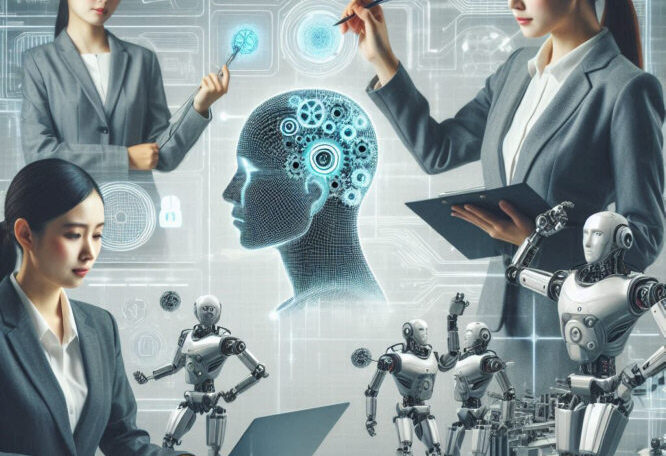
Implementing Artificial Intelligence (AI) projects in the business environment and in the manufacturing industry offers a wide range of benefits that can transform the way companies operate and compete in the market. Below, some of these benefits are described in detail, with specific examples to illustrate how AI can improve efficiency, productivity and innovation in these sectors.
Improving Operational Efficiency
One of the main benefits of AI in the business environment is the improvement of operational efficiency. AI algorithms can analyze large volumes of data in real time, identifying patterns and trends that may not be apparent to humans. For example, in a manufacturing plant, AI can monitor machine performance and predict when failures are likely to occur, enabling preventative maintenance and reducing downtime. This not only improves efficiency, but also extends the life of equipment and reduces repair costs.
Supply Chain Optimization
AI can optimize the supply chain by providing complete, real-time visibility into all aspects of the process. AI systems can predict product demand more accurately, allowing businesses to adjust their inventory and production levels accordingly. For example, a manufacturing company can use AI to analyze historical sales data and external factors such as weather conditions and market trends, adjusting its operations to meet demand without incurring unne
Improved Decision Making
AI can improve decision making by providing business leaders with accurate, real-time information. AI systems can analyze data from multiple sources and generate detailed reports that help managers make informed decisions. For example, a manufacturing company can use AI to analyze production and sales data, identifying areas for improvement and optimizing its operations to maximize efficiency and profitability.
Safety and Compliance
In the manufacturing industry, AI can improve safety and compliance by monitoring operations and detecting potential risks. AI systems can analyze data from sensors and cameras to identify dangerous behaviors or unsafe conditions, alerting supervisors to take preventative action. For example, a manufacturing plant can use AI to monitor the use of personal protective equipment (PPE) and ensure that employees comply with safety regulations, thereby reducing the risk of accidents and injuries.
Sustainability and Energy Efficiency
AI can contribute to sustainability and energy efficiency by optimizing resource use and reducing waste. AI systems can analyze energy consumption data and recommend measures to improve energy efficiency. For example, a manufacturing plant can use AI to monitor the energy consumption of its machines and adjust their operation to reduce consumption during peak demand, which not only reduces energy costs but also minimizes environmental impact.
Improving Product Quality
AI can improve product quality by enabling more accurate and efficient quality control. AI systems can analyze production data in real time and detect defects or inconsistencies in products, allowing companies to take corrective action immediately. For example, a manufacturing company can use AI to inspect products on the production line and detect defects that might go unnoticed by human inspectors, thus ensuring that only high-quality products reach the market.
Flexibility and Adaptability
Finally, AI can provide companies with greater flexibility and adaptability in an ever-changing business environment. AI systems can quickly adapt to new market conditions and demands, allowing businesses to respond more agilely and efficiently. For example, a manufacturing company can use AI to adjust its operations based on changes in market demand, ensuring that they are always aligned with the needs of its customers.
Conclusion
Implementing Artificial Intelligence projects in the business environment and in the manufacturing industry offers a wide range of benefits that can transform the way companies operate and compete in the market. From improving operational efficiency and optimizing the supply chain to personalizing the customer experience and reducing costs, AI has the potential to drive innovation and growth in these sectors. By adopting AI, companies can not only improve their competitiveness, but also create a safer, more sustainable and efficient environment.
I hope this explanation has been useful to you. Is there any other aspect of AI that you would like to explore further?

Please let us know how can we help you filling the following form or gives a call: +52 55 9103 9093 , number in Mexico.
Contáctenos llenando este formato o puede llamar al +52 55 9103 9093 en México.
Por favor, díganos sus necesidades y requerimientos.




